Description
Food supplement in the form of a hard capsule containing a complex of 8 B-vitamins, enriched in choline (VitaCholine) and inositol, also known as vitamin B8.
Want to improve the condition of your nervous system and enjoy high energy levels? Check that you are providing adequate amounts of B vitamins. They are responsible for the smooth running of a number of processes in the body, contributing to, among other things, a reduction in the feeling of fatigue and the proper functioning of the immune system. Reach for the B complex with choline and inositol and take care of your condition on many levels.
B vitamins are a complex of eight water-soluble vitamins essential for the body to function properly. They mainly affect the condition of the nervous system, brain health and energy levels. The group includes: Vitamin B1 (thiamin), B2 (riboflavin), B3 (niacin), B5 (pantothenic acid), B6 (pyridoxine), B7 (biotin), B9 (folic acid) and B12 (cobalamin).
Vitamins B1, B3, B6, B7 and B12 support the maintenance of normal psychological functions, nervous system function and energy metabolism. Thiamine, riboflavin, niacin, pantothenic acid and biotin help to obtain energy from carbohydrates, fats and protein. Niacin, on the other hand, also breaks down carbohydrates and fat, but this breakdown occurs mostly during exercise [1]. The influence of B vitamins on normal blood production cannot be overlooked. Pyridoxine, folic acid and cobalamin contribute to the normal production of red blood cells, low levels of which can lead to anaemia [1]. In addition, they help the immune system to function optimally and, together with choline, support homocysteine metabolism. Vitamins B2, B6, B12, folic acid, niacin and pantothenic acid also have a significant effect on reducing feelings of fatigue and tiredness.
What properties do the individual B vitamins have? Thiamine – or vitamin B1 – is often found in food supplements in the form of thiamine hydrochloride, and its active form is diphosphate, to which it is converted in the body. The main sources of thiamine are whole grain products, meat and fish [2].
Riboflavin, or vitamin B2, is mainly found in three forms: free riboflavin, flavin adenine dinucleotide (FAD) and flavin mononucleotide (FMN, riboflavin 5′-phosphate). Riboflavin can be provided by consuming, for example, eggs, offal, lean meat and milk [3].
Niacin, or vitamin B3, is found in the form of nicotinic acid , nicotinic amide (niacinamide) and related derivatives such as nicotinamide riboside. Niacin can be provided by products of animal (e.g. poultry, beef) or plant origin (e.g. nuts, legumes) [4].
Pantothenic acid, is one form of vitamin B5, and coenzyme A (CoA) is its biologically active form. Vitamin B5 deficiency is rare – mainly because pantothenic acid is present in many foods. For example, it can be found in large quantities in chicken, beef, offal, whole grain products and selected vegetables [5, 6].
The term “vitamin B6” encompasses 6 compounds that are mutually transformed. These include pyridoxine, pyridoxal, pyridoxamine and the phosphate esters of these compounds. Pyridoxal 5’phosphate (PLP) and pyridoxamine 5’phosphate (PMP) are the active coenzyme forms of vitamin B6. Vitamin B6 in the diet can be found in liver, fish, offal and starch-rich vegetables, among others [7].
Biotin, or vitamin B7, is mainly associated with positive effects on the condition of skin, hair and nails. Most biotin is found in offal, eggs, fish, meat, seeds and nuts [8].
Folate, also known as vitamin B9, is a generic term for naturally occurring pterin derivatives, including folic acid, found in foods or added to food supplements. The methylated, biologically active form of vitamin B9 is L-methylfolate (L-5-MTHF). The benefits of its supplementation are particularly important for people with a mutation in the MTHF gene, which impairs the ability to convert folate to its active form, 5-MTHF. Good sources of it include, for example, spinach, liver and Brussels sprouts [9].
Vitamin B12 is called cobalamin – due to the fact that it contains the mineral cobalt. It is found in various forms, in supplements most commonly as cyanocobalamin and active methylcobalamin. This substance is mainly found in foods of animal origin (e.g. meat, fish, eggs and dairy products) [10].
The B vitamin complex – as a group of energy-generating nutrients – is particularly important for active people. It is therefore important to ensure that it is supplied with the diet [1]. It is worth noting that deficiency of a particular B vitamin is usually associated with low levels of other B vitamins [7]. Typical symptoms of a deficiency include skin symptoms, clotting, hair loss, nervous system complaints (e.g. headaches, irritability, apathy, memory disorders), fatigue, cardiovascular disorders or anaemia.
Choline and inositol are also often assigned to the B vitamin group, although they do not meet the definition of vitamins. Choline, known as ‘vitamin B4’, plays a significant role in cell membrane signalling, lipid transport and metabolism, and early brain development, among other things. It also supports liver function, and its deficiency can cause disorders of this organ. Sources of choline are mainly foods of animal origin (e.g. meat, fish, eggs) and brassica vegetables, beans, nuts, seeds and whole grain products [11]. Inositol, the so-called ‘vitamin B8’, exhibits multidirectional effects by being a component of phospholipids and cell membranes and a precursor in the synthesis of hormone messengers. It can also have a positive effect on metabolic disorders [12]. This substance is present, for example, in legumes, nuts and some fresh fruits and vegetables [13].
Complex-B with choline and inositol contains forms of vitamins that have been appropriately selected for their action and health benefits. In addition to containing all B vitamins in high concentrations, it is also enriched with choline (VitaCholine®) and inositol. The product comes in the form of easy-to-swallow small capsules and has no unnecessary additives, so you can enjoy a comfortable and safe supplementation. We recommend taking one capsule daily, preferably in the morning.
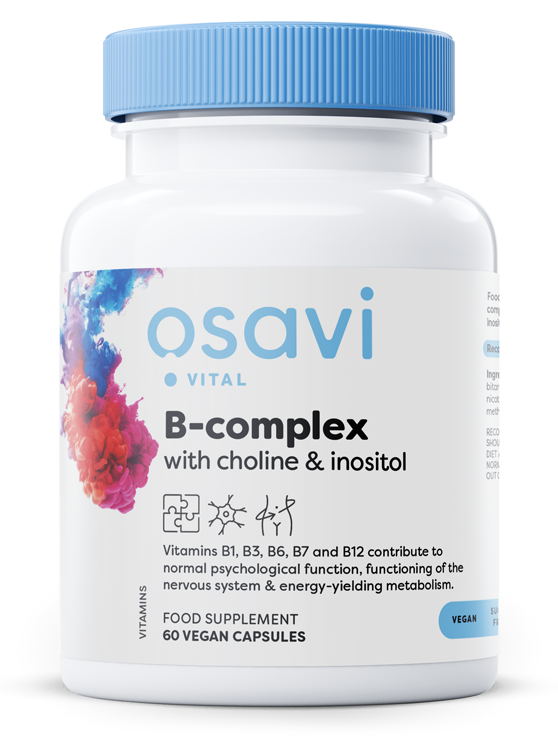

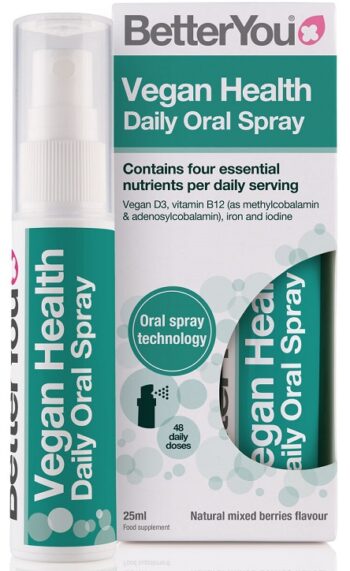


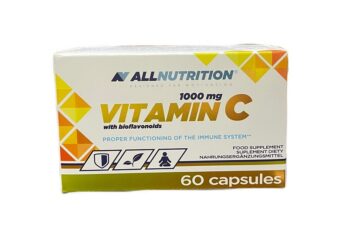

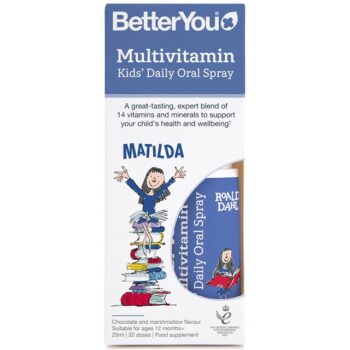
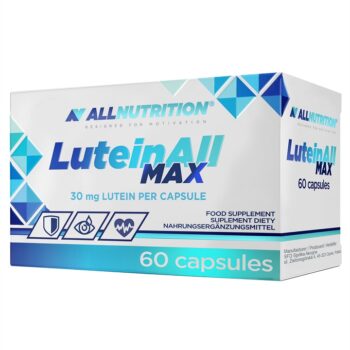

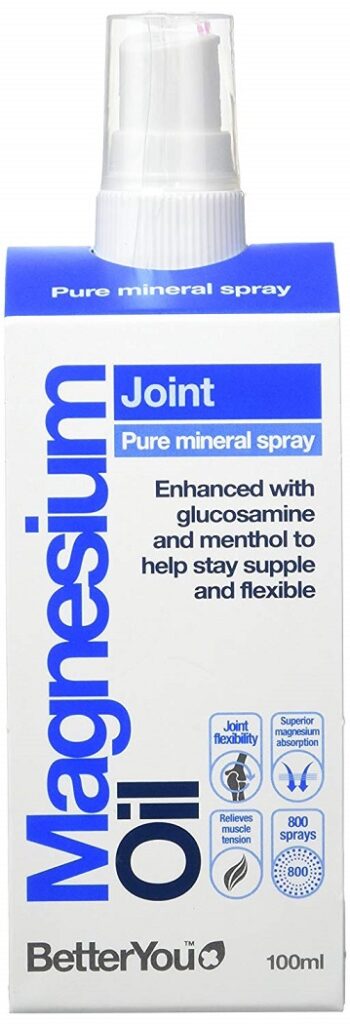

Reviews
There are no reviews yet.